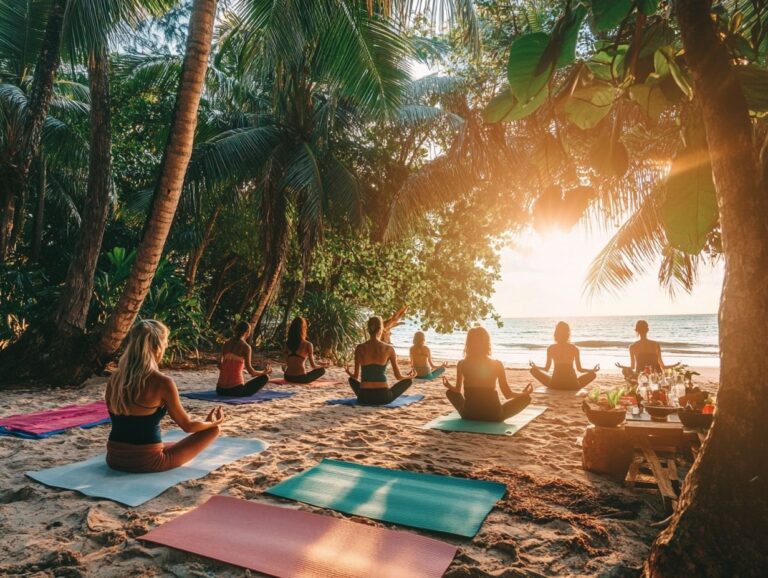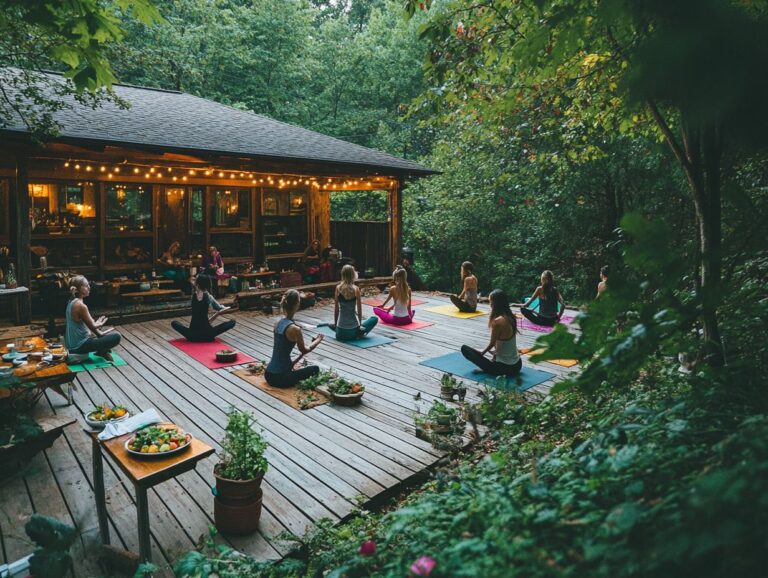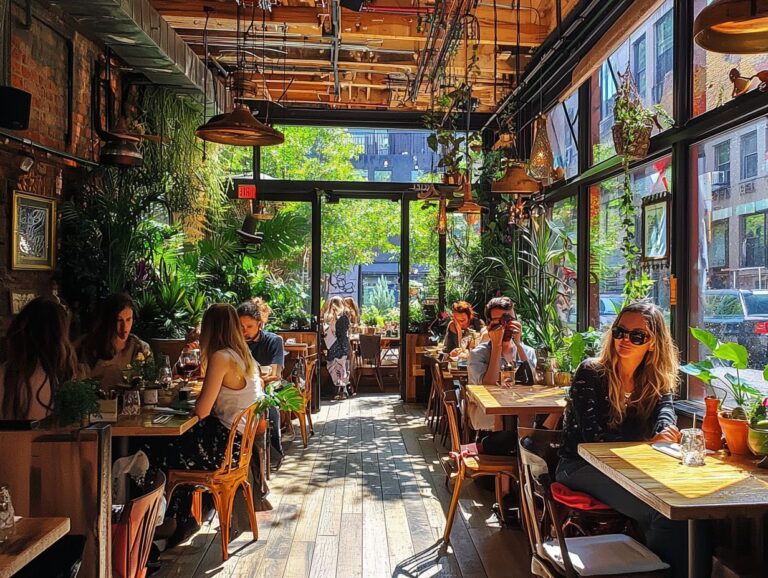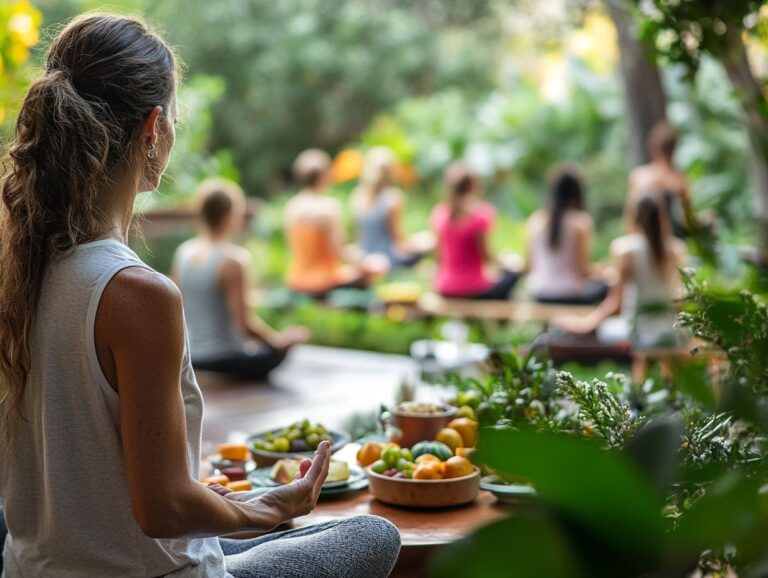Spain serves as a hub for transformative experiences through vegan retreats. By integrating nourishing plant-based cuisine with holistic wellness practices, these retreats offer opportunities for rejuvenating both the mind and body against the backdrop of stunning landscapes. Each retreat features a unique combination of activities, including yoga, meditation, and cooking classes, all designed to enhance physical health, mental clarity, and foster a deeper connection with nature.
Vegan Retreats in Spain: A Haven for Mind and Body
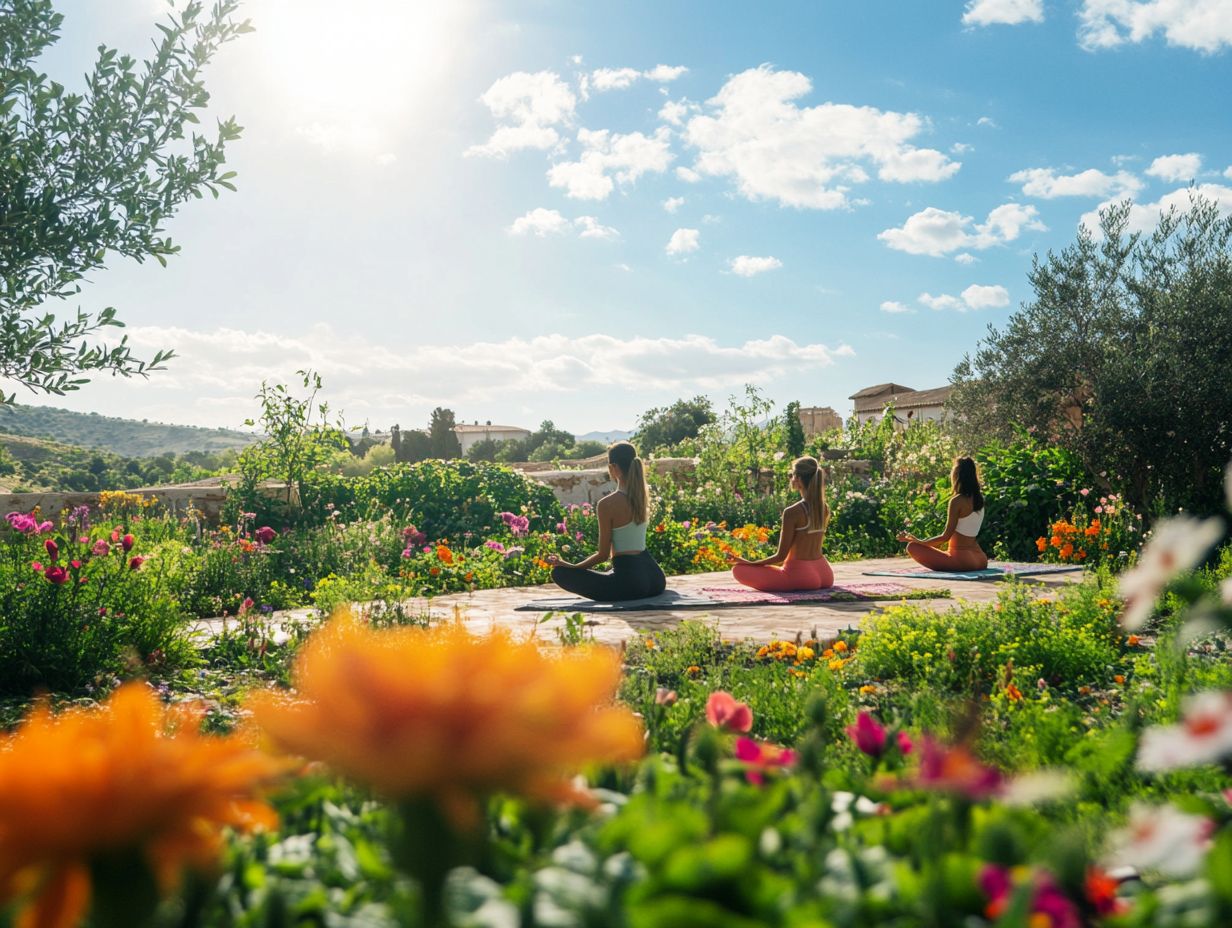
Vegan retreats in Spain offer a unique oasis for the mind and body, providing an immersive wellness experience set in nature and surrounded by picturesque landscapes like the Sierra Morena.
Participants at these retreats have the opportunity to engage in activities that promote both physical and mental well-being. Emphasizing the importance of healthy plant-based cuisine, these retreats serve delicious vegetarian meals that align with the Mediterranean diet.
In addition to focusing on healthy eating, they encourage emotional insights through practices such as yoga, meditation, Chi Kung, and Vinyasa yoga. Herbal tea is often served to complement these activities, enhancing relaxation and reflection.
What is a Vegan Retreat?
A vegan retreat is a specialized getaway centered on health, wellness, and holistic living, where participants can immerse themselves in a variety of activities designed to enhance both physical and mental well-being. Whether it’s a yoga retreat focusing on Vinyasa yoga or a meditation session, Spain’s vegan retreats offer diverse experiences.
These activities include yoga detox sessions, mindfulness practices, meditation, and Falun Gong. Typically held in serene environments, such as the lush landscapes of Sierra Morena or historic sites like Castillo de Maimón, these retreats allow individuals to disconnect from their daily routines and reconnect with themselves on a deeper level.
The purpose of these wellness experiences goes beyond simply enjoying plant-based meals; participants also have the opportunity to attend nutrition workshops that educate them about the benefits of a vegan lifestyle and how to incorporate wholesome foods into their everyday diets. Engaging in language practice or exploring Spanish tradition adds a cultural dimension to these retreats.
Engaging in yoga sessions helps cleanse the body and elevate the spirit, while mindfulness practices foster greater awareness of one’s thoughts and feelings.
Overall, these vegan retreats provide a nurturing space for personal growth and rejuvenation.
Why Choose Spain for a Vegan Retreat?
Spain offers numerous advantages for vegan retreats, including stunning natural scenery, rich cultural heritage, delicious vegetarian cuisine, and a strong emphasis on the benefits of the Mediterranean diet for personal health and relaxation. Notable areas like Córdoba and centers such as Azulfit provide unique settings for these enriching wellness experiences.
The country’s diverse traditions, art, and music create a unique and vibrant atmosphere for participants seeking an alternative experience. With its breathtaking coastline and picturesque countryside, Spain provides peaceful environments that foster mind-body harmony, encouraging personal tranquility and creativity.
The Mediterranean diet is celebrated as one of the healthiest in the world, featuring a wide variety of plant-based foods, fresh fruits, and locally sourced ingredients, transforming meals into culinary masterpieces. Each vegan dish captures the essence of Spanish cuisine, allowing participants to both enjoy and nourish their bodies.
Being in this beautiful country helps participants feel more connected to their values, as well as to the land and its people.
The Benefits of Attending a Vegan Retreat in Spain
Attending a vegan retreat in Spain offers several advantages, including notable improvements in physical health through plant-based nutrition, enhanced mental clarity from intensive yoga sessions, and profound emotional insights gained from mindfulness practices and connections with nature.
1. Improved Physical Health
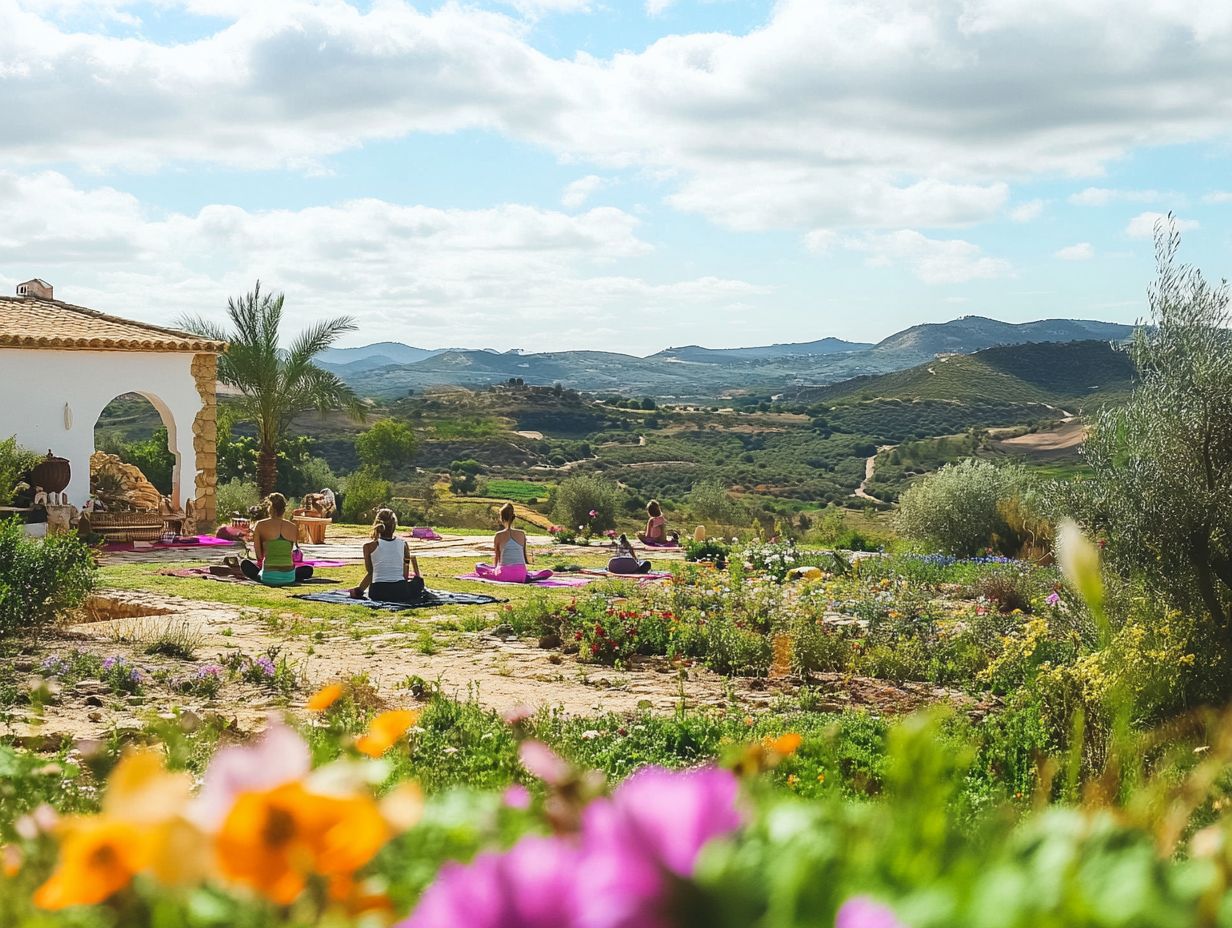
Attending a vegan retreat offers numerous benefits, with improved physical health being one of the most significant. Participants enjoy a carefully curated vegan diet featuring nutritious vegetarian meals inspired by the Mediterranean diet. Meals often include traditional Spanish favorites like tomato toast, providing both nourishment and a taste of local culture.
This nutritional approach not only maximizes the advantages of whole, plant-based foods but also incorporates a diverse array of colorful fruits and vegetables, healthy fats from olive oil, and increased amounts of legumes and whole grains.
These foods are rich in antioxidants and essential nutrients, which can enhance energy levels, improve digestion, and reduce the risk of chronic diseases.
For those new to plant-based living, the delicious offerings at these retreats often demonstrate how the Mediterranean diet and veganism can be harmoniously combined, resulting in meals that truly promote physical health.
2. Mental Clarity and Focus
Yoga and meditation, including intensive yoga sessions, at a vegan retreat can significantly enhance mental clarity and focus, allowing individuals to cultivate emotional awareness and improve overall cognitive functioning. These sessions, held in serene settings like those at The Art of Living Retreat Center, support profound personal insights. These experiences enable participants to gain a deeper understanding of themselves, which is essential for effectively navigating the pressures of modern life.
As participants engage in breathwork and movement, many discover that these practices together create a serene environment free from distractions. In this stillness, they can process their thoughts more clearly and make more mindful choices.
Over time, the combination of movement and meditation aids in stress relief, fostering a healthier mindset and greater emotional resilience to face future challenges.
3. Connection with Nature
Attending vegan retreats in Spain offers the added benefit of fostering a strong connection with nature, particularly in areas like Sierra Morena. Here, participants can engage in outdoor activities that promote mindfulness and enhance their overall wellness experience.
These retreats typically feature a diverse range of activities, including guided hiking, yoga in stunning landscapes, and meditative nature walks, all designed to immerse attendees in their surroundings.
As participants navigate the lush trails of Sierra Morena, they cultivate a deeper appreciation for the natural world, which helps them achieve a sense of peace and grounding. The tranquility of the environment encourages reflection on their thoughts and emotions, often resulting in a heightened awareness of their well-being.
This natural setting nurtures not only the soul but also the community among those seeking a holistic wellness experience.
Types of Vegan Retreats in Spain
Spain offers a diverse selection of vegan retreats, including those that combine intensive yoga practices with plant-based cuisine, cooking retreats centered around vegetarian meals, and meditation retreats that emphasize mindfulness and relaxation. Esteemed retreats like Wanderlust Yoga and Samahita Retreat exemplify the various options available.
1. Yoga and Veganism Retreats
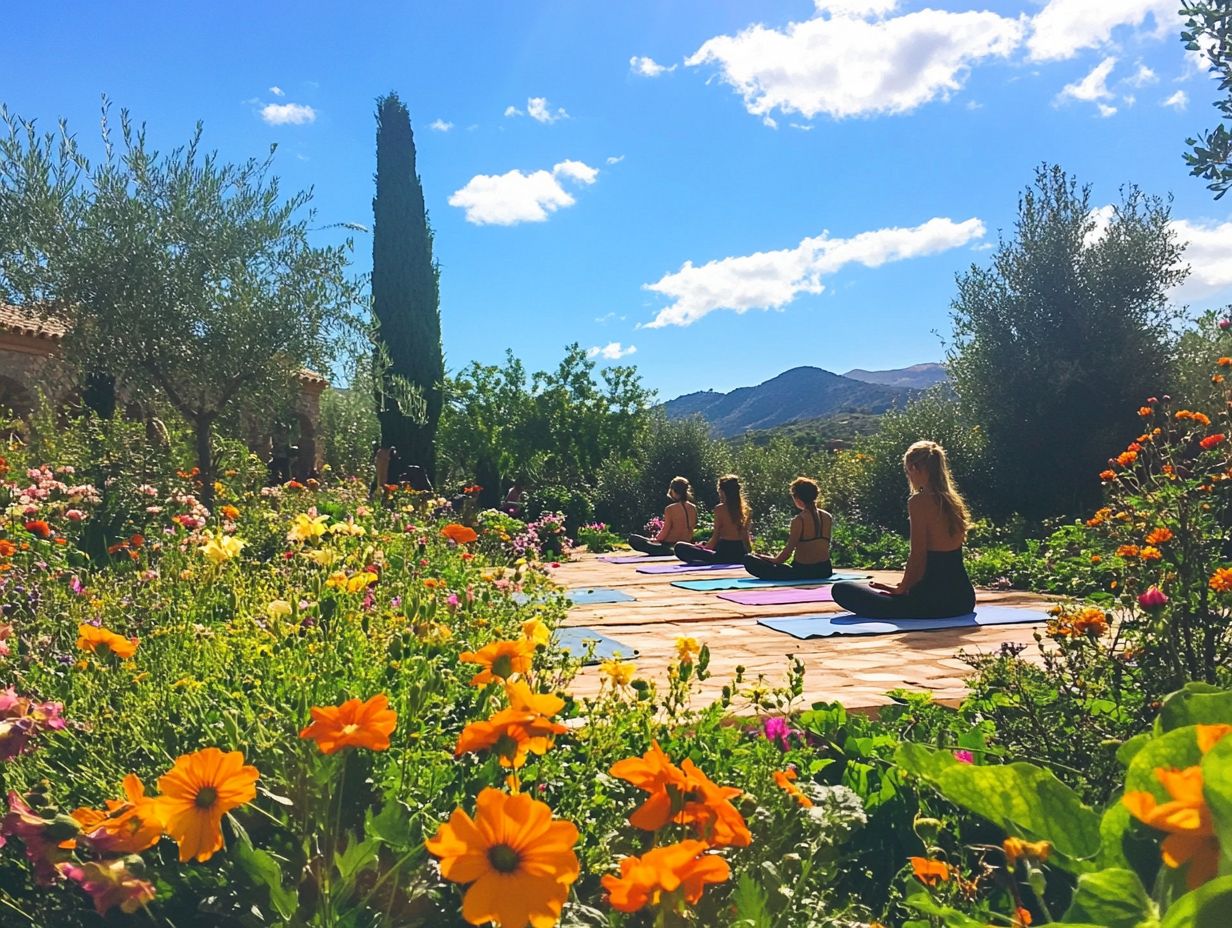
Yoga and veganism retreats in Spain offer a unique blend of intensive yoga practices and the principles of a vegan lifestyle, creating a holistic wellness experience that enhances both physical and mental well-being. These retreats, like those at Soulshine Bali and Anamaya Resort, are known for pushing participants’ limits while fostering community.
Participants engage in daily intensive yoga sessions that push their physical limits while improving flexibility and strength. In addition, the culinary aspect is thoroughly explored, with expert chefs preparing delicious and nutritious vegan meals that nourish the body and uplift the spirit.
Guided meditation sessions further enrich the experience, allowing individuals to connect with their inner selves and cultivate mindfulness. This integration of yoga and plant-based living not only fosters a sense of community among attendees but also encourages them to embrace healthier lifestyle choices long after the retreat concludes.
2. Cooking and Nutrition Retreats
Cooking and nutrition retreats offer participants the opportunity to learn how to prepare plant-based meals, emphasizing the importance of nutritious vegetarian dishes as key components of a healthy vegan lifestyle.
These retreats typically include cooking classes where attendees can learn to create salads, grain and bean bowls, and even desserts. Participants gain insights into the nutritional value of various ingredients and how to prepare balanced meals. These retreats often feature dishes inspired by Spanish cuisine and the Mediterranean diet, using local produce to enhance flavor and health benefits.
They also explore seasonal produce and discover ways to incorporate fruits and vegetables into their daily diets. Additionally, topics such as meal planning and food sustainability are often covered in these retreats.
3. Meditation and Mindfulness Retreats
Meditation and mindfulness retreats offer participants the opportunity to explore emotional insights and practice various methods for enhancing their overall wellness. These retreats provide a temporary escape from daily routines, allowing individuals the necessary space to reflect on themselves and discover inner peace. With programs at places like The Sharpham Trust and Mount Madonna Center, attendees often experience transformative emotional insights.
Participants typically engage in guided meditations, breathwork, yoga, and practices such as Falun Gong, all designed to help them connect with themselves on a deeper level. Centers like Mellulah Yoga and Mindfulness Retreat and Omega Institute offer structured programs that enhance this connection. By exploring different mindfulness practices, individuals can uncover hidden levels of stress and anxiety, enabling them to identify and release emotional blocks.
The group environment fosters a sense of community, allowing participants to share their journeys and insights together. Embracing these practices can lead to transformative changes that promote emotional clarity and resilience.
How to Choose the Right Vegan Retreat in Spain
When choosing a vegan retreat in Spain, it is important to consider several key factors, including the types of activities offered, such as yoga detox and meditation sessions, as well as the location, whether it’s in the peaceful countryside or vibrant cities like Córdoba. Consider renowned centers like Moinhos Velhos for a comprehensive experience.
- Location and Setting: Determine whether you prefer a beachside environment or a mountainous area that is remote from major towns and city life. Additionally, research the typical weather in Spain during the time of year you plan to visit. It is also beneficial to select a retreat located in a region of Spain that interests you, as the country boasts many diverse and beautiful areas.
- Activities and Workshops: If you have specific activities or workshops in mind, ensure that the retreat you are considering offers them during your stay. Checking this in advance will help you make the most of your experience.
- Accommodations: Think about the level of comfort you desire in your accommodations, whether you prefer something simple or more luxurious. Consider the amenities available, such as a pool or hot tub. If you will be sharing accommodations, inquire about the number of other guests you will be sharing with and the gender breakdown of those guests.
By taking these factors into account, you can find a vegan retreat in Spain that suits your preferences and needs, offering an authentic Spanish holiday experience with a focus on wellness.
1. Location and Setting
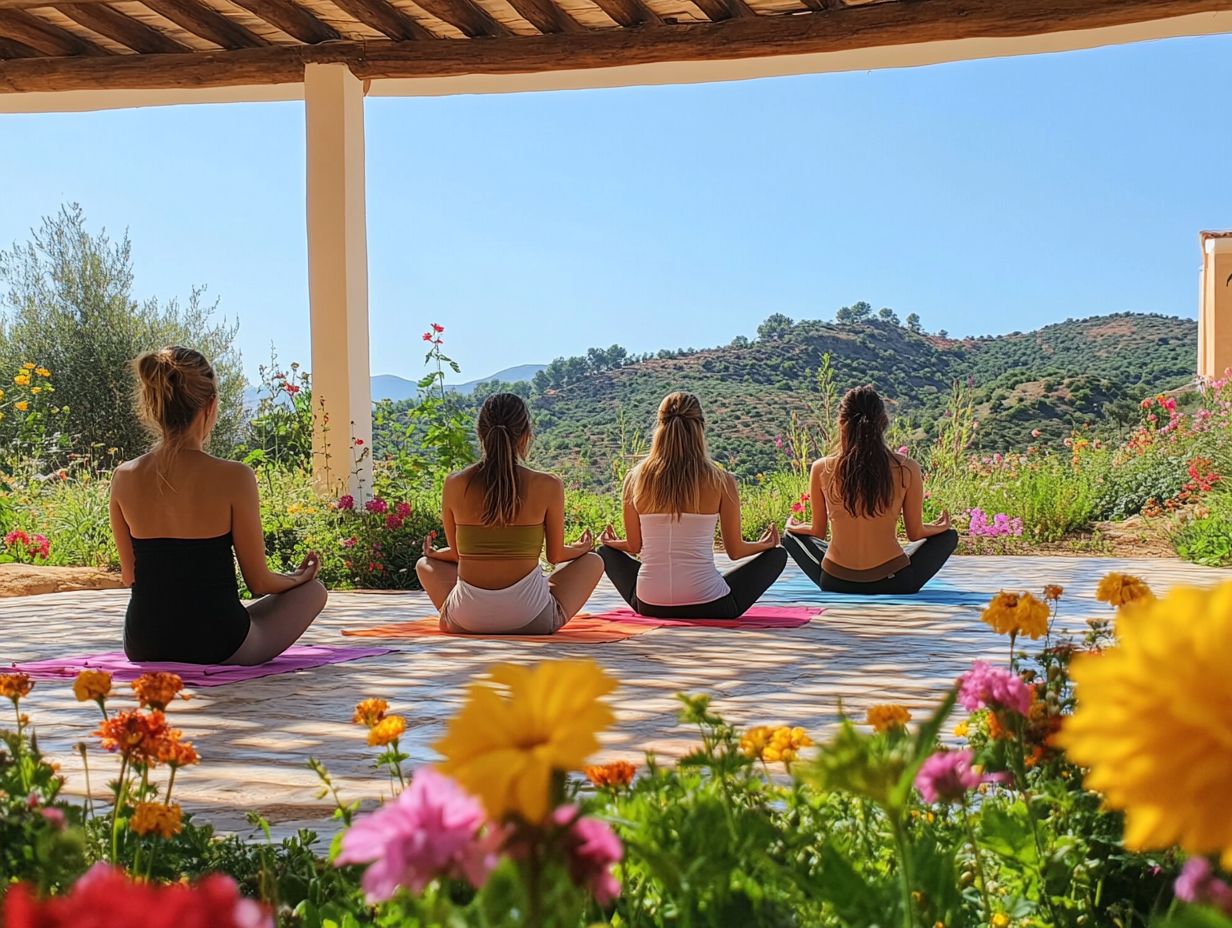
The location and setting of a vegan retreat significantly influence the overall experience. Retreats situated in serene natural environments, such as the Sierra Morena, offer breathtaking beauty that enhances relaxation and wellness. This mountainous area is perfect for a yoga retreat, providing opportunities for intensive yoga sessions amid the tranquility of nature.
Selecting a retreat nestled among green hills or in a coastal setting can greatly affect one’s journey toward mindfulness and healing. In Spain, retreat locations range from the tranquil mountains of Sierra Morena to the sun-soaked beaches of the Costa Brava.
These settings not only provide stunning backdrops but also foster a sense of tranquility and connection with nature. Such environments encourage participants to escape the stresses of everyday life, enjoy nourishing vegan and vegetarian meals like a traditional tomato toast or a hearty vegetarian lunch, and engage in holistic healing practices, thereby enriching the overall retreat experience.
2. Activities and Workshops Offered
The activities and workshops offered at a vegan retreat play a crucial role in shaping the overall retreat experience, encompassing yoga classes, cooking workshops, and guided meditation sessions, all designed to enhance health and wellness. Participants might engage in Vinyasa yoga or explore practices like Chi Kung and Falun Gong for emotional insights and personal growth.
These immersive activities extend their benefits beyond physical wellness by fostering a sense of community among participants. Yoga classes provide individuals with an opportunity to reconnect with their bodies while promoting flexibility and mindfulness.
Cooking workshops encourage participants to explore exciting new plant-based recipes and develop their culinary skills, often inspired by the rich flavors of the Mediterranean diet. Guided meditation sessions equip participants with tools to manage stress, enhance mental clarity, and support personal growth, sometimes drawing from the teachings of renowned centers like Anamaya Resort and Samahita Retreat.
Each workshop and class aligns with the holistic philosophy of the retreat, inviting individuals to discover new passions and gain a deeper understanding of a vegan lifestyle. This balanced mix of activities promotes overall well-being and contributes to the transformative nature of the retreat experience.
3. Accommodations and Amenities
Accommodations and amenities at vegan retreats play a crucial role in ensuring participants’ comfort and enhancing their overall wellness experience.
Options range from luxurious lodges to cozy eco-friendly lodgings. These retreats often feature a variety of amenities designed to promote relaxation and rejuvenation, including spa treatments, yoga studios, and meditation spaces.
Participants can choose from private rooms with breathtaking views or shared accommodations that foster a sense of community and connection. Many venues offer organic meals tailored to individual dietary needs, ensuring that the culinary experience aligns seamlessly with the wellness journey.
The thoughtful integration of these elements creates an environment where individuals can fully immerse themselves in self-care and personal growth, transforming the retreat into more than just a getaway but a truly transformative experience. Those interested in a deeper experience may consider the renowned programs offered at places like The Art of Living Retreat Center or The Sharpham Trust.
Tips for Preparing for a Vegan Retreat in Spain
To prepare for a vegan retreat in Spain, it is essential to conduct thorough research on the retreat and its instructors. Exploring options like those offered at Soulshine Bali or Moinhos Velhos can provide insight into what to expect from a comprehensive wellness experience.
Additionally, packing appropriately for the climate and planned activities is crucial.
It is also important to consider any dietary restrictions or preferences to ensure a comfortable and enjoyable experience.
1. Research the Retreat and Its Instructors
Researching the retreat and its instructors is a crucial step in preparing for a vegan retreat, as it ensures the quality of the experience and the expertise of those leading the sessions. You might find inspiration in Spanish tradition or international influences from centers like Omega Institute and Mount Madonna Center.
Individuals should explore the backgrounds, qualifications, and philosophies of the instructors to determine whether their teaching styles will help achieve personal goals and align with individual values. While understanding the instructors is essential, it is also important to consider the facilities, overall agenda, and community of the retreat, as these factors significantly impact the experience.
Additionally, reviews and testimonials from former attendees provide valuable insights that can aid in the research process. Conducting thorough research not only safeguards a significant investment but also enhances the likelihood of a life-changing journey that aligns with one’s wellness goals.
2. Pack Appropriate Clothing and Gear
Packing appropriate clothing and gear for a vegan retreat is essential for ensuring comfort and preparedness for various activities, including yoga sessions, outdoor excursions, and meditation practices.
Selecting the right items can significantly enhance the overall experience, enabling attendees to focus on self-improvement and their connection with nature.
Lightweight, breathable fabrics are ideal for yoga and meditation, as they promote freedom of movement and comfort during practice. If hiking is planned, sturdy footwear is crucial for outdoor activities. It is advisable to pack layers to accommodate temperature changes from day to night, and bringing a reusable water bottle is necessary to stay hydrated.
Proper packing allows participants to fully engage in the retreat experience without unnecessary distractions.
3. Plan for Dietary Restrictions
Planning for dietary restrictions at a vegan retreat is crucial to ensure that participants can fully enjoy the healthy food and culinary experiences without concerns about allergens or personal preferences.
Addressing dietary restrictions should be part of the planning process to create an inclusive environment, and it is important to communicate openly with participants before the retreat begins.
Providing an online form for guests to communicate their dietary needs is an effective approach, although conversations during the booking process can also be beneficial. Many retreats, such as those at Azulfit or Wanderlust Yoga, emphasize the importance of tailoring menus to the needs of their guests.
Guests should feel encouraged to voice their dietary requirements, as this not only ensures they receive meals that meet their needs but also fosters a sense of community and shared understanding among participants at the retreat.

